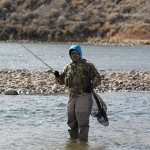I am a consumer that recognizes value, and appreciates great service. As a new fly fisherman (but a veteran fisherman), I took significant time to research many of the reels, rods and terminal tackle available to me. As a long time buyer of salt and fresh water products, I expected that quality equipment would cost me plenty. That said, I did not expect that rods from Sage, Winston, G. Loomis and Orvis would start in the $350 range, and only head north from there. Available reels from Tibor, Abel and Bauer also came at a high price ($300+). The challenge for me was to find a rod/reel combination that allowed me to maximize results during my limited time on the water (and at a reasonable price).
My thorough investigation of the fly fishing equipment marketplace brought me to a Colorado based company called Elkhorn Fly Rod and Reel. Historically, I have always supported local businesses that produce good products, and offer superior service. The online reviews on Elkhorn equipment were very positive (and the price was right) so I purchased an Elkhorn Butler Series rod (5 weight), and armed it with an Elkhorn T2 reel. Over the last 18 months, I have fished many rivers in Colorado and Wyoming; enjoying some of the best waters in the country. The weather (snow, rain and wind) I have fished in has pushed me and my equipment to the limit. Put to frequent tests, my Elkhorn rod/reel has performed extraordinarily well. My Butler series rod allows me to quickly notice subtle strikes while nymphing. The T-2’s (reel) drag system becomes noticeably relevant as a 22” rainbow rushes down stream with a small nymph clinging to the corner of her mouth. I have been so impressed with Elkhorn products that I purchased 2 more reels (T-1 and MA-2) and the complementary rods (Traveler Series).
During my last trip to the North Platte River, I fell while trying to net a fish. While I did eventually land the fish, I unfortunately dinged up my rod. I asked Elkhorn to evaluate the rod, in order to determine if the structure remained sound. Brian Chavet, the owner of Elkhorn, actually called me to discuss his findings after thoroughly testing the rod’s integrity. It is that type of service (and expertise) that will keep me a long-time Elkhorn customer.
If you are in the market for a new setup, I suggest you evaluate the equipment from Elkhorn Fly Rod and Reel.


![Reblog this post [with Zemanta]](https://img.zemanta.com/reblog_e.png?x-id=8d8b425f-d589-468b-8c5a-dc4f997f16cb)

![Reblog this post [with Zemanta]](https://img.zemanta.com/reblog_e.png?x-id=d14bbed8-825c-4a5e-af4d-7bb41ff03e56)
![Reblog this post [with Zemanta]](https://img.zemanta.com/reblog_e.png?x-id=d1331725-afd6-4a44-bcdd-7a02f6adf25a)
![Reblog this post [with Zemanta]](https://img.zemanta.com/reblog_e.png?x-id=9fcb9e4c-d72c-4de8-8e46-c820c5308ddf)
![Reblog this post [with Zemanta]](https://img.zemanta.com/reblog_e.png?x-id=182b0d5b-9bed-41fa-9e8a-1b03014a2b0f)